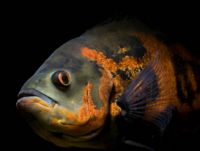Difference between revisions of "Astronotus ocellatus"
From The Aquarium Wiki
| Line 8: | Line 8: | ||
|caption=Red Tiger Oscar | |caption=Red Tiger Oscar | ||
|availability=C | |availability=C | ||
| − | |temperament= | + | |temperament=Aggressive |
|habitat=South America | |habitat=South America | ||
|family=Cichlidae | |family=Cichlidae | ||
Revision as of 01:09, 4 September 2017
Oscar
Astronotus ocellatus
284 Litres (75 US G.)
25.4-40.6cm (10-16 ")
Freshwater
6.2 - 7.5
22.2-25°C (72 -77 °F)
6-10 °d
1:1 M:F
6-12 years
Family
Cichlidae
This animal is available captive bred
Contents
Additional names
- Oscar, Tiger Oscar, Red Oscar, Albino Oscar, Marble Cichlid, Velvet Cichlid, Lutino Oscar
Additional scientific names
- Acara compressus, Acara hyposticta, Astronotus ocellatus ocellatus, Astronotus ocellatus zebra, Astronotus orbiculatus, Cychla rubroocellata, Lobotes ocellatus
Origin
- Oscars come from Peru, Ecuador, Colombia, Brazil, and French Guiana. They live in the Amazon River Basin. This fish can be found in slow moving white water under submerged branches and rocks.
Sexing
- Unlike many Cichlids, it's impossible to tell the sex of Oscars other than venting or by catching them spawning. See the link below entitled "Sexing Oscars", which is a study on the sexing and breeding of Oscars.
Tank compatibility
- A highly territorial fish, so be wary with tank mates, since an Oscar will likely eat any fish that will fit into their mouth. Any tank mates must be large and semi-aggressive, such as Synodontis Catfish, large Plecos, Pictus Catfish, Tinfoil Barbs or Banded Leporinus. Tank mates must only be attempted in tanks over 379 Litres (100 US G.).
Diet
- Oscars should be fed a varied diet to maintain optimum health. They will eat most anything, but good quality Cichlid pellets should be the staple of their diet. Live foods, including crickets, earthworms, bloodworms and other insects, promote good digestion. In the wild, an Oscar's diet is approximately 60% insects.
- Avoid feeding store-bought Feeder Fish, these fish are typically very stressed or diseased, and can lead to health complications in Oscars. Feeder fish may provide a small amount of nutritional value, but tend to make Oscars more aggressive towards any tanks mates.
- Oscars also benefit from some vegetables in their diet such as lettuce, peas, zucchini and cucumber. Soaking pellets in liquid vitamins occasionally will help prevent the fish coming down with Hole in the Head disease.
Feeding regime
- Feed once or twice a day, however be prepared to be begged for food constantly by your Oscar, and rest assured that this is one fish that would be quite happy to eat all day long. Oscars are also known to be quite intelligent fish, and it is quite common for them to become so fond of a particular food or foods that they will not accept or even acknowledge other types of foods.
- Oscars are voracious eaters and will happily eat any time their human is in proximity to their tank, but once an Oscar reaches about 6 inches in length, they only need to be feed once or maybe twice a day.
- Please note that although the Oscar will eat abnormally often it is probably not advisable in the interest of the long term health of your fish to feed them more than what is recommended.
Environment Specifics
- Exceptionally large and well filtered tank required. Any décor must be stable and heavy so as not to be knocked over and damage the tank. Any planting may be "rearranged". Also a heavy secure lid is suggested as Oscars are known to jump out of the tank and even injure themselves if they try and jump and crash into the lid.
Behaviour
- Oscars can be highly aggressive and territorial fish. Only keep in a large aquarium with fish around its size. They are also known as messy fish, so superb filtration is a must when keeping these fish. Oscars are very hardy fish that can tolerate a range of water conditions, but they are susceptible to a variety of diseases due to poor water quality. They are also very intelligent and are able to distinguish between their owners and other humans. Oscars are well known and loved by aquarium hobbyists due to their varied but always entertaining personalities and antics.
Identification
- A large oval-shaped fish with large eyes and a paddle-like caudal fin. Colouration is varied and includes albino. Long-fin varieties are rare but do exist. Albino and pale-coloured Oscars have been seen to be targeted in the dyed fish trade.
- The main colour variants are:
- Wild Type - deep olive grey body with some darker black and some orange-red patches
- Albino - white body, red eyes
- Lutino Cross - white body with orange irregular patches
- Orange - grey-olive base colour with a red-orange "blush" across the majority of the body
- Red Tiger - closest variant to the wild-type Oscar, a deep olive-grey body with irregular orange bands criss-crossing the flanks
- Red - similar to the Orange, but a deeper red in colour and may have some darker banding through the "blush"
- It must be noted that in their first year of life, Oscars are quite fast growing, in a spacious tank with good nutrition will happily grow around 0.5"-1" a month, slowing at around 6 months, achieving around 7"-8" within a year. After that the growth rate will slow down.
Pictures
Error creating thumbnail: Unable to save thumbnail to destination |
We have more images on this subject in our gallery located here |
Videos
| Spawning: | Parents with fry: |
External links
- Fishbase (Mirrors: Error creating thumbnail: Unable to save thumbnail to destination)
- Tropical Fish Friends
- Oscarfish.com
- Oscar Fish Lover
- Fishforums.net
- Sexing Oscars
- Oscar Cichlids
- Oscar Profile & Videos
- Oscar Profile & Images
- Practical Fishkeeping - Definitive guide to Oscars by Heiko Bleher




